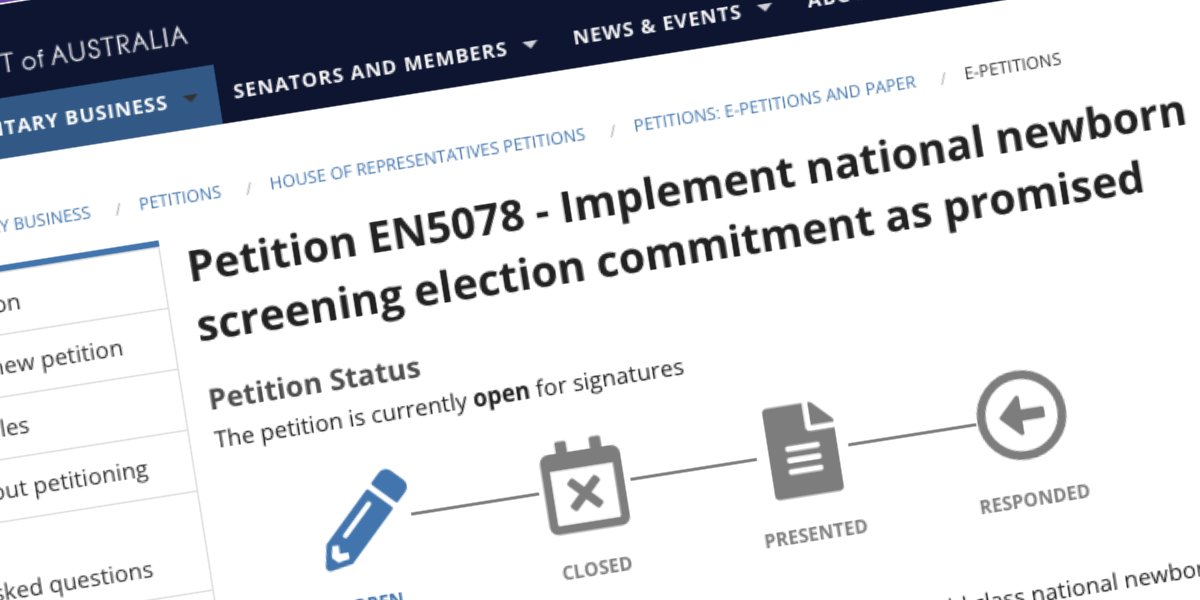Better Access Australia has launched a petition to the parliament calling for the Albanese Government to honour their election commitment to introduce a world class national newborn screening program for 80 diseases in 2023.
With delays in diagnosis more than double for babies living in rural and remote Australia, the failure to implement the screening as promised is a critical issue for communities already suffering from inadequate health service access in rural Australia. The Albanese Government promised to introduce the screening program before the last election, but broke it in their first year of office.
“821 babies will be born today and up to 5 will go home this week missing out on the lifesaving diagnosis of a rare disease the Prime Minister promised them as part of his election commitments,” Better Access Australia Chair Felicity McNeill said.
“12 months on and not only do we have no national newborn screening program for 80 diseases, we have been asked to accept the status quo program that was always in place: disease by disease, state by state with priorities determined by bureaucrats and assessment by a committee that has publicly admonished the value of population based screening for rare diseases in babies and lung cancer in the general population because of the costs of treatment they represent.”
“This is not an acceptable approach because it will not change the health outcomes for our children as the Prime Minister promised.”
“Australian children are being lost every year to perinatal and congenital health conditions. As the Australian Institute of Health and Welfare data confirms, these are the leading cause of death in our babies and the second greatest cause of death for children aged 1-14.”
“Many of these deaths would have been prevented from 1 July if the Albanese Government had implemented the world class national newborn screening program they promised Australian families on 6 April 2022.”
“Many more children would have received an early diagnosis preventing permanent and irreversible disability.”
“Instead, 5 families everyday will take their child home and somewhere in the next 90 days to three years be told that their child is extremely unwell and that treatment could have begun immediately and permanent disability or even worse would have been prevented if the Prime Minister had implemented the newborn screening program he promised us.”
The issue is more critical in regional and rural areas, where the difficulties of accessing a GP, let alone a paediatrician or other specialists, delay diagnosis and hamper access to treatment.
“These delayed diagnosis statistics more than double when it comes to families living in rural and remote Australia with the minimum timeframe 180 days not 90.”
“Access to primary care services, let alone specialists has never been tougher in our rural and remote communities,” Ms McNeill said.
“Babies with Pompe disease have been waiting for 12 years for this test. The Prime Minister promised Pompe would be a priority in Australia’s 80 disease world class national newborn screening program to be rolled out this year.”
“And yet the Health Minister has confirmed this is no longer the Government’s commitment alongside everything else that has been set aside in this election commitment.”
“Rare disease patients aren’t a photo opportunity – they deserve equal access to diagnosis and treatment and deserve to trust in their politicians to deliver what they promised,” Ms McNeill added.
Over 85% of people polled before the election supported the expansion and national approach to newborn blood spot screening.
Better Access Australia has registered a petition with the House of Representatives asking the Prime Minister to deliver is election commitment and save these tiny lives with:
- A world class national newborn screening program covering 80 diseases in 2023
- A one-off catch-up review of all the evidence available globally on those 80 diseases by an MBS Taskforce stye review which includes input from paediatricians, patients, parents and ethicists, as well as disease experts
- Truly end the postcode lottery for newborn screening by making it a national program consistent with either the National immunisation Program or Medical Benefits Scheme.
- Ongoing biannual reviews of current and emerging technology in bloodspot screening, genomic and genetic testing to future-proof the care of our newborns.
To sign the petition go to: https://www.aph.gov.au/e-petitions/petition/EN5078
Like what you’re reading? Support New England Times by making a small contribution today and help us keep delivering local news paywall-free. Donate now


